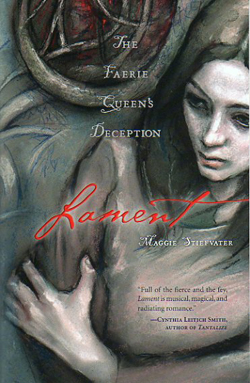Lament: The Faerie Queen’s Deception
by Maggie Stiefvater
Reviewed by Amal El-Mohtar
 I live in Cornwall, England, where the winter is very damp. Matches won’t strike, salt goes moist, and my calendar pages curve inward while the covers of my books curl outward. Maggie Stiefvater’s Lament has the distinction of being the only trade paperback in my soggy flat to have stood firm against the air and kept its shape, which predisposes me to like it. I have a notion that Julia Jeffrey’s gorgeous cover art is charmed proof against the weather.
I live in Cornwall, England, where the winter is very damp. Matches won’t strike, salt goes moist, and my calendar pages curve inward while the covers of my books curl outward. Maggie Stiefvater’s Lament has the distinction of being the only trade paperback in my soggy flat to have stood firm against the air and kept its shape, which predisposes me to like it. I have a notion that Julia Jeffrey’s gorgeous cover art is charmed proof against the weather.
Lament is the story of Deirdre Monaghan, an unexceptional girl in Eastern Virginia with a demanding mother, an adorable best friend, and a harp. Her life takes a turn for the strange when a charming, enigmatic stranger named Luke appears at an arts festival and helps calm her pre-performance anxiety; suddenly she’s finding four-leafed clovers by the handful, seeing things others can’t, and discovering new strengths in herself that attract the unwelcome attention of the Fae.
I found this book completely readable, and enjoyed it very much; it’s smoothly written, straightforwardly plotted, and charismatically narrated. That said, it isn’t without its problems, and while I’m inclined to forgive many of them on particular grounds, they’re worth mentioning.
First, to the positive. As a harpist, I was delighted to find a realistic treatment of harp performance in the novel. Small things pleased me: the description of nerves tingling up and down the arms before performance, the sometimes desperate search for a space to practice in before performing at a venue, the over-elaborated directions on how to get to those spaces by well-meaning organisers who appear to have no idea how stressed out you are. I appreciated that tremendously, and found myself nodding along at how seamlessly those details were woven into the story. Stiefvater also does a lovely job of portraying Deirdre’s relationship with her best friend, James, who is hands down my favourite character. A goofy, charismatic piper, his voice is always genuine, and his interaction with Deirdre is well-realised, going from affectionately sardonic to unconditionally supportive in seconds.
What I found less appealing was
Lament’s reliance on a number of well-established genre tropes, and while there are enough surprises to keep it from being strictly a paint-by-numbers fairy romance, it sometimes leans on those tropes a little heavily. There’s a thousand-year-old silent sufferer of fairy-dealt torment; there’s a cruel fairy queen; there’s a spunky heroine who fights her on her love’s behalf. No one is called by any variation of the name Tam Lin, although Thomas the Rhymer makes an appearance. I won’t say I disapprove of those elements; in fact, I often actively seek them out, especially as the whole is frequently more than the sum of its parts. What rubs me the wrong way, however, is that at the centre of
Lament is a girl who isn’t beautiful or strong until a boy tells her she is.
Deirdre’s relationship with Luke both attracted and frustrated me by turns. On the one hand, this is the kind of novel that makes you want to suspend your disbelief and shelve your post-teenage years in order to participate in the adolescent fantasy of being the centre of a sexy, dangerous, brooding man’s universe; on the other, it often makes maintaining that suspension very, very difficult.
I was also left wondering whether certain plot holes were inadvertent flaws or threads left deliberately unresolved in order to be picked up in the sequel.
Ballad comes out in the Fall of 2009, and while there’s no cliffhanger ending to
Lament, there is a sense throughout the novel of plot points introduced and then dropped, leaving sometimes gaping holes in the narrative. I expect that many of these will be picked up in
Ballad, and so will let them pass, but will certainly judge the sequel more strictly based on how it deals with those gaps, if at all.
I did, however, quite enjoy Stiefvater’s representation of Faerie. There’s an intriguing twist to her treatment of it, all to do with the notion of “cloverhands,” that makes me itch to give it some good old postcolonial deconstruction. There are divisions among the Good Folk that do more than play along the conventional Seelie / Unseelie lines, and while those divisions sometimes feel overexploited for convenience’s sake, they make for an interesting read, especially when those occasional conveniences feel adequately earned by warm, likeable characters.
Ultimately,
Lament pulled me along smoothly from performance to danger to romance to resolution, and made short, enjoyable work of a five hour train ride. This is a novel that, in spite of its problems, fits snugly into the tradition of “music brings the faeries ’round,” and would certainly be enjoyed by fans of Charles de Lint, Holly Black, Emma Bull and Midori Snyder.
 I live in Cornwall, England, where the winter is very damp. Matches won’t strike, salt goes moist, and my calendar pages curve inward while the covers of my books curl outward. Maggie Stiefvater’s Lament has the distinction of being the only trade paperback in my soggy flat to have stood firm against the air and kept its shape, which predisposes me to like it. I have a notion that Julia Jeffrey’s gorgeous cover art is charmed proof against the weather.
I live in Cornwall, England, where the winter is very damp. Matches won’t strike, salt goes moist, and my calendar pages curve inward while the covers of my books curl outward. Maggie Stiefvater’s Lament has the distinction of being the only trade paperback in my soggy flat to have stood firm against the air and kept its shape, which predisposes me to like it. I have a notion that Julia Jeffrey’s gorgeous cover art is charmed proof against the weather.
